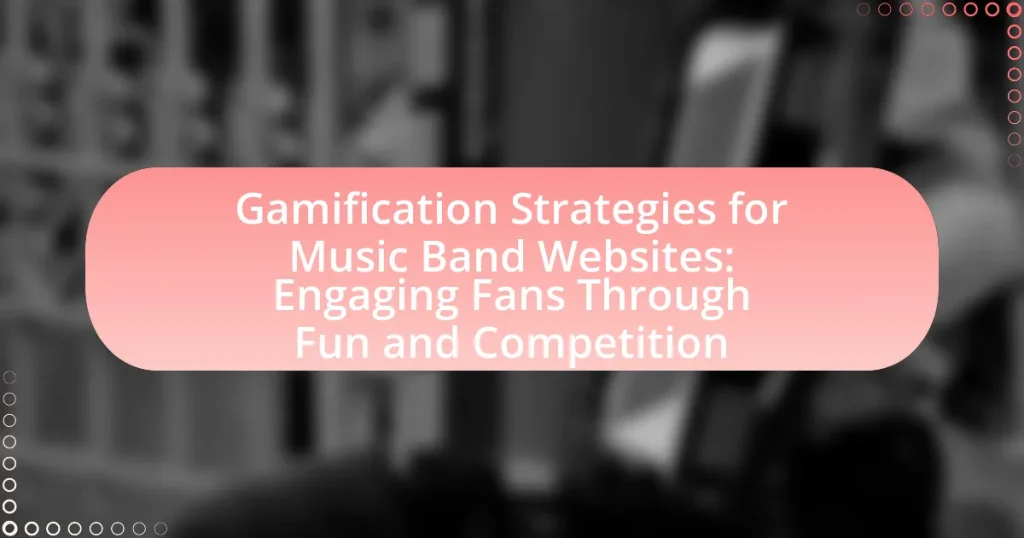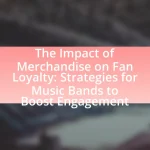Gamification strategies for music band websites involve the integration of interactive features such as quizzes, contests, and reward systems designed to enhance fan engagement and loyalty. These strategies leverage psychological principles like motivation and community building, resulting in increased participation and emotional connections between fans and bands. The article explores various gamification techniques, including leaderboards and reward systems, and discusses their effectiveness in driving user engagement, social media interaction, and overall fan loyalty. Additionally, it addresses potential challenges and best practices for implementing gamification successfully, ensuring that strategies align with brand identity and audience preferences.
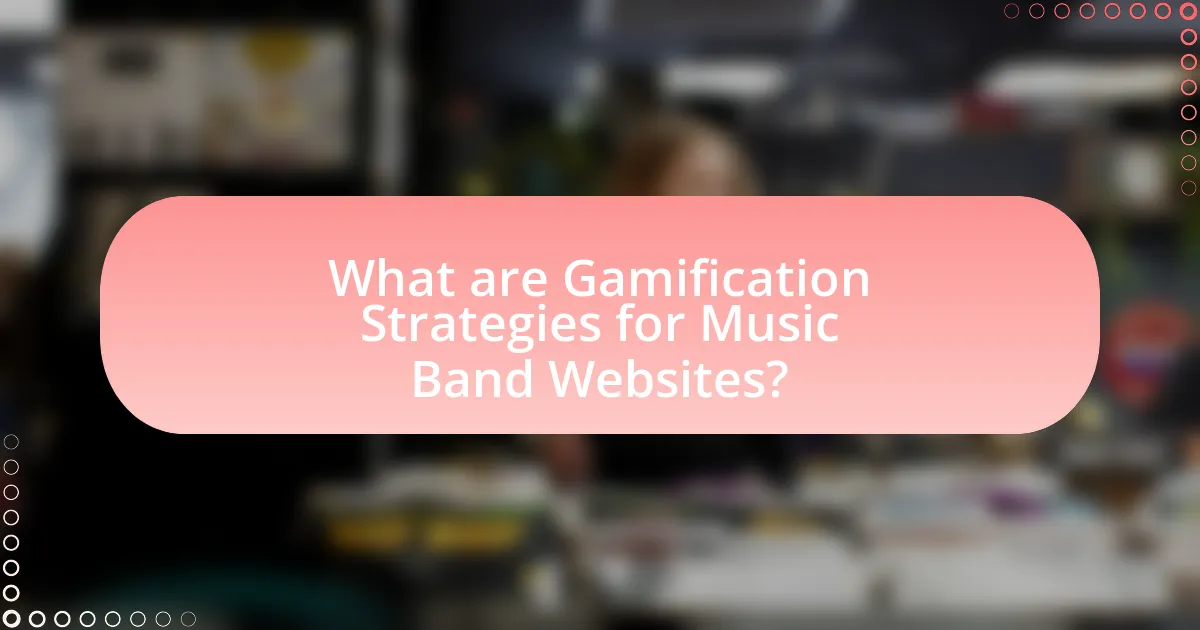
What are Gamification Strategies for Music Band Websites?
Gamification strategies for music band websites include interactive features such as quizzes, contests, and reward systems that engage fans and enhance their experience. For instance, implementing a points system where fans earn rewards for participating in activities like sharing content or attending concerts can increase engagement. Additionally, leaderboards can foster competition among fans, motivating them to interact more frequently with the website. Research shows that gamification can lead to a 48% increase in user engagement, demonstrating its effectiveness in maintaining fan interest and loyalty.
How do gamification strategies enhance fan engagement?
Gamification strategies enhance fan engagement by incorporating game-like elements into interactions, which increases motivation and participation. These strategies, such as leaderboards, rewards, and challenges, create a sense of competition and achievement among fans. For instance, a study by Hamari et al. (2014) found that gamification can significantly boost user engagement by 30% in various contexts, including music platforms. By making fan interactions more enjoyable and rewarding, gamification fosters a deeper emotional connection to the music band, ultimately leading to increased loyalty and community building.
What psychological principles underpin gamification in music?
Gamification in music is underpinned by several psychological principles, including motivation, engagement, and reinforcement. Motivation is driven by intrinsic factors, such as the enjoyment of music and the desire for self-expression, as well as extrinsic factors like rewards and recognition. Engagement is enhanced through interactive elements that create a sense of community and competition among fans, fostering a deeper connection to the music and the band. Reinforcement, particularly through positive feedback and rewards for participation, encourages continued interaction and loyalty. Research by Hamari et al. (2014) in “Gamification: Definitions, Benefits, and Challenges” highlights how these principles effectively increase user engagement and satisfaction in various contexts, including music.
How do gamification strategies differ from traditional engagement methods?
Gamification strategies differ from traditional engagement methods by incorporating game-like elements to enhance user interaction and motivation. Traditional engagement methods often rely on passive content consumption, such as newsletters or social media posts, which do not actively involve users in the experience. In contrast, gamification introduces elements like points, badges, leaderboards, and challenges that encourage active participation and competition among users. Research indicates that gamified experiences can increase user engagement by up to 48%, as they tap into intrinsic motivations and provide immediate feedback, making the interaction more rewarding and enjoyable.
Why are gamification strategies important for music bands?
Gamification strategies are important for music bands because they enhance fan engagement and loyalty through interactive experiences. By incorporating elements such as rewards, challenges, and competitions, bands can create a more immersive environment that encourages fans to participate actively. Research indicates that gamification can increase user engagement by up to 100%, as it taps into the psychological motivations of fans, making them feel more connected to the band and its activities. This connection can lead to increased merchandise sales, concert attendance, and social media sharing, ultimately benefiting the band’s overall success and visibility in a competitive industry.
What impact do gamification strategies have on fan loyalty?
Gamification strategies significantly enhance fan loyalty by increasing engagement and creating a sense of community among fans. When music band websites implement gamification elements such as rewards, challenges, and leaderboards, fans are more likely to participate actively and feel a deeper connection to the band. Research indicates that 70% of fans reported increased loyalty to brands that utilized gamification effectively, as it fosters a competitive yet enjoyable environment that encourages repeated interactions. This engagement not only strengthens the emotional bond between fans and the band but also promotes long-term loyalty, as fans are motivated to return for new challenges and rewards.
How can gamification strategies increase social media interaction?
Gamification strategies can increase social media interaction by incorporating game-like elements that motivate users to engage more actively. These strategies, such as point systems, leaderboards, and challenges, create a sense of competition and achievement among users, encouraging them to participate in discussions, share content, and interact with posts. For instance, a study by Deterding et al. (2011) highlights that gamification can enhance user engagement by tapping into intrinsic motivations, leading to higher interaction rates on social media platforms. Additionally, brands that implement gamification often see increased user-generated content, as fans are incentivized to create and share their own experiences related to the brand, further boosting overall interaction.
What types of gamification strategies can be implemented on music band websites?
Music band websites can implement various gamification strategies, including reward systems, interactive challenges, and social sharing incentives. Reward systems can involve points or badges for fan engagement activities, such as attending concerts or purchasing merchandise, which encourages ongoing participation. Interactive challenges, such as quizzes or contests related to the band’s music, can enhance fan interaction and knowledge. Social sharing incentives can motivate fans to share content on their social media platforms, rewarding them with exclusive content or discounts. These strategies have been shown to increase fan loyalty and engagement, as evidenced by case studies from successful music bands that have utilized gamification to enhance their online presence.
What are the most popular gamification techniques used in music websites?
The most popular gamification techniques used in music websites include leaderboards, badges, and interactive challenges. Leaderboards foster competition among users by ranking them based on their engagement or achievements, which encourages repeated visits and participation. Badges serve as rewards for completing specific tasks or reaching milestones, providing users with a sense of accomplishment and recognition. Interactive challenges, such as quizzes or contests related to the music or band, engage fans actively and enhance their connection to the content. These techniques have been shown to increase user engagement and retention on music platforms, as evidenced by studies indicating that gamified elements can boost user interaction by up to 50%.
How can rewards and incentives be structured effectively?
Rewards and incentives can be structured effectively by aligning them with specific goals and audience preferences. This alignment ensures that the rewards resonate with the target demographic, enhancing engagement and motivation. For instance, offering exclusive content, merchandise, or experiences that fans value can significantly increase participation in gamified activities. Research indicates that personalized rewards lead to a 20% increase in user engagement, as they create a sense of ownership and connection to the brand. Additionally, implementing tiered reward systems can encourage ongoing participation, as users are motivated to reach higher levels for better rewards.
How can music bands measure the success of their gamification strategies?
Music bands can measure the success of their gamification strategies by analyzing key performance indicators (KPIs) such as user engagement, retention rates, and conversion metrics. User engagement can be assessed through metrics like the number of interactions with gamified elements, time spent on the website, and participation in challenges or contests. Retention rates indicate how many fans return to engage with the gamified content over time, reflecting the effectiveness of the strategy in maintaining interest. Conversion metrics, such as the increase in merchandise sales or ticket purchases linked to gamified campaigns, provide concrete evidence of financial success. For instance, a study by the Journal of Interactive Marketing found that gamification can increase user engagement by up to 100%, demonstrating its potential impact on a band’s overall success.
What challenges might music bands face when implementing gamification?
Music bands may face several challenges when implementing gamification, including a lack of understanding of their audience’s preferences, difficulty in creating engaging content, and potential technical issues. Understanding audience preferences is crucial, as misalignment can lead to low participation rates; for instance, a survey by Eventbrite found that 78% of millennials prefer experiences over material goods, indicating a need for engaging, experience-based gamification. Additionally, creating content that resonates with fans while maintaining the band’s brand identity can be complex, as it requires a balance between fun and authenticity. Technical issues, such as integrating gamification features into existing websites or platforms, can also pose significant hurdles, as bands may lack the necessary resources or expertise. These challenges highlight the importance of strategic planning and audience research in successful gamification implementation.
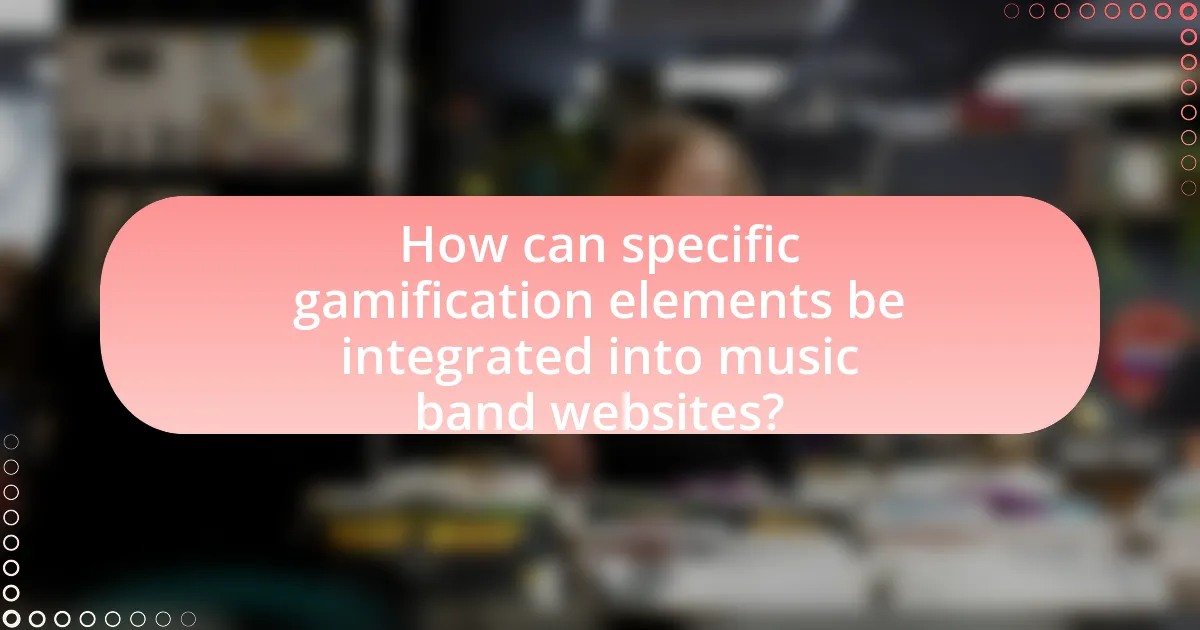
How can specific gamification elements be integrated into music band websites?
Specific gamification elements can be integrated into music band websites by incorporating features such as points systems, leaderboards, and interactive challenges. Points systems reward fans for engaging with content, such as listening to songs or sharing posts, which can enhance user interaction. Leaderboards can display top fans based on their points, fostering a sense of competition and community among followers. Interactive challenges, like quizzes about the band or fan art contests, encourage participation and creativity, making the website more engaging. Research indicates that gamification can increase user engagement by up to 48%, demonstrating its effectiveness in enhancing fan interaction on music band websites.
What role do leaderboards play in engaging fans?
Leaderboards play a crucial role in engaging fans by fostering competition and enhancing user interaction. They provide a visual representation of rankings, motivating fans to participate more actively in activities related to the music band, such as voting, sharing content, or attending events. Research indicates that gamification elements like leaderboards can increase user engagement by up to 48%, as they create a sense of achievement and community among fans. This competitive aspect encourages fans to strive for higher positions, leading to increased loyalty and a deeper connection with the band.
How can leaderboards be designed to motivate participation?
Leaderboards can be designed to motivate participation by incorporating elements such as clear goals, real-time updates, and rewards for various levels of achievement. Clear goals provide participants with specific targets to aim for, enhancing their engagement and commitment. Real-time updates keep users informed of their progress and the standings of others, fostering a competitive spirit. Additionally, offering rewards, such as exclusive content or recognition, for different tiers of achievement encourages broader participation, as it allows more users to feel a sense of accomplishment. Research indicates that gamification elements, including leaderboards, can increase user engagement by up to 48%, demonstrating their effectiveness in motivating participation.
What are the potential downsides of using leaderboards?
The potential downsides of using leaderboards include fostering unhealthy competition, discouraging participation, and creating a sense of exclusion among users. Unhealthy competition can lead to stress and anxiety, as individuals may feel pressured to outperform others rather than enjoy the activity. This pressure can discourage casual participants from engaging, as they may perceive the leaderboard as a barrier to entry. Additionally, leaderboards can create feelings of exclusion for those who consistently rank lower, potentially alienating fans and diminishing their overall experience. Research indicates that such competitive environments can negatively impact motivation and engagement, particularly if users feel they cannot achieve recognition.
How can quizzes and challenges enhance fan interaction?
Quizzes and challenges enhance fan interaction by providing engaging and interactive experiences that foster a sense of community among fans. These activities encourage participation, allowing fans to showcase their knowledge and skills related to the music band, which can lead to increased loyalty and connection. For instance, a study by the Journal of Interactive Marketing found that gamified elements, such as quizzes, can boost user engagement by up to 50%, demonstrating their effectiveness in capturing attention and promoting interaction.
What types of quizzes resonate most with music fans?
Music fans resonate most with quizzes that test their knowledge of song lyrics, artist trivia, and music history. These types of quizzes engage fans by challenging their familiarity with their favorite artists and songs, often leading to a sense of accomplishment when they answer correctly. For instance, quizzes that ask participants to identify songs from short audio clips or match lyrics to the correct song title have proven popular, as they tap into fans’ emotional connections to the music. Additionally, quizzes that explore niche genres or specific eras in music can attract dedicated fans who enjoy showcasing their expertise.
How can challenges be structured to encourage participation?
Challenges can be structured to encourage participation by incorporating clear goals, immediate feedback, and social elements. Clear goals provide participants with specific objectives to achieve, which enhances motivation and focus. Immediate feedback allows participants to track their progress and adjust their strategies, fostering a sense of accomplishment. Social elements, such as leaderboards or team-based challenges, create a sense of community and competition, which can significantly increase engagement. Research indicates that gamification techniques, such as these, can lead to higher participation rates, as seen in studies on user engagement in online platforms where structured challenges are implemented effectively.
What are the benefits of incorporating social sharing features?
Incorporating social sharing features enhances user engagement and expands audience reach for music band websites. These features allow fans to easily share content, such as songs or events, on their social media platforms, which can lead to increased visibility and potential new followers. Research indicates that content shared on social media can generate up to 1,000% more engagement than content that is not shared, demonstrating the significant impact of social sharing on audience interaction and growth. Additionally, social sharing fosters a sense of community among fans, encouraging them to connect and interact with each other, which can strengthen their loyalty to the band.
How can social sharing amplify the reach of gamification efforts?
Social sharing can significantly amplify the reach of gamification efforts by leveraging users’ social networks to spread engagement and participation. When users share their achievements or experiences related to gamified elements, such as contests or rewards, it creates organic visibility and encourages their friends and followers to participate. Research indicates that social sharing can increase user engagement by up to 30%, as seen in studies conducted by the Journal of Interactive Marketing, which highlight the viral nature of shared content. This amplification effect not only enhances the visibility of gamification initiatives but also fosters a community around the brand, driving further interaction and loyalty among fans.
What strategies can be used to encourage fans to share their achievements?
To encourage fans to share their achievements, music band websites can implement gamification strategies such as reward systems, social sharing incentives, and community recognition. Reward systems, like points or badges for sharing achievements, motivate fans to engage and promote their accomplishments. Social sharing incentives, such as exclusive content or discounts for fans who share their achievements on social media, create a direct benefit for participation. Community recognition, through leaderboards or featured posts, fosters a sense of belonging and encourages fans to showcase their successes. These strategies are effective as they leverage intrinsic and extrinsic motivations, enhancing fan engagement and visibility for the band.
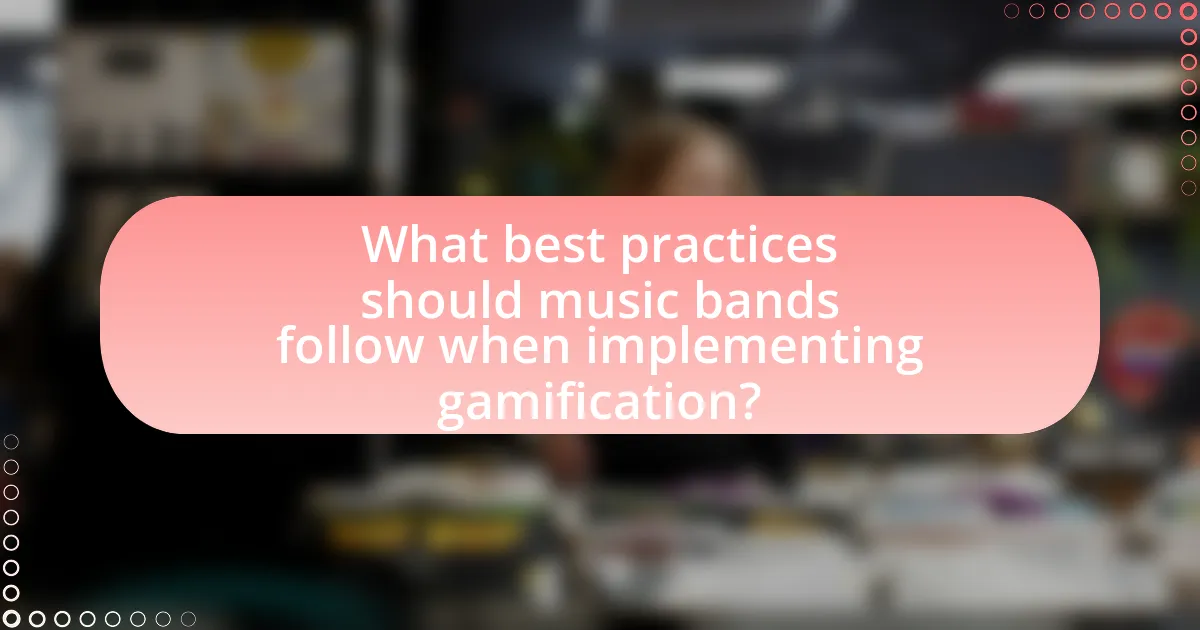
What best practices should music bands follow when implementing gamification?
Music bands should prioritize clear objectives, audience engagement, and reward systems when implementing gamification. Establishing specific goals, such as increasing fan interaction or promoting new music, helps guide the gamification strategy effectively. Engaging the audience through interactive elements like quizzes, challenges, or contests fosters a sense of community and keeps fans invested. Additionally, implementing a reward system, such as exclusive content or merchandise for participation, incentivizes fans to engage more actively. Research indicates that gamification can enhance user experience and loyalty, as seen in studies where brands that utilized gamified elements reported a 30% increase in user engagement.
How can music bands ensure their gamification strategies are user-friendly?
Music bands can ensure their gamification strategies are user-friendly by prioritizing intuitive design and clear instructions. Intuitive design involves creating interfaces that are easy to navigate, allowing fans to engage with the gamified elements without confusion. Clear instructions help users understand how to participate, which can increase engagement and satisfaction. Research indicates that user-friendly interfaces lead to higher user retention rates; for example, a study by Nielsen Norman Group found that usability improvements can increase user engagement by up to 50%. By focusing on these aspects, music bands can create effective and enjoyable gamification experiences for their fans.
What design elements contribute to a positive user experience?
Design elements that contribute to a positive user experience include intuitive navigation, responsive design, and visually appealing aesthetics. Intuitive navigation allows users to easily find information, enhancing usability; studies show that 94% of users cite easy navigation as a key factor in their satisfaction. Responsive design ensures that websites function well on various devices, which is crucial as mobile traffic accounts for over 50% of global web traffic. Visually appealing aesthetics, including consistent color schemes and typography, engage users and can increase retention rates by up to 80%. These elements collectively create an enjoyable and efficient interaction for users, particularly in the context of gamification strategies for music band websites.
How can feedback from fans be utilized to improve gamification efforts?
Feedback from fans can be utilized to improve gamification efforts by directly informing the design and functionality of gamified elements. By collecting and analyzing fan feedback through surveys, social media interactions, and user behavior data, music bands can identify which gamification features resonate most with their audience. For instance, if fans express a preference for competitive elements like leaderboards or challenges, bands can prioritize these features in their gamification strategy. Research indicates that user engagement increases when gamification aligns with user preferences, as seen in studies like “The Impact of Gamification on User Engagement” by Hamari et al. (2014), which highlights the correlation between tailored gamification and enhanced user satisfaction. Thus, leveraging fan feedback not only enhances the relevance of gamified experiences but also fosters a stronger connection between the band and its audience.
What common pitfalls should music bands avoid in gamification?
Music bands should avoid overcomplicating gamification elements, as this can lead to confusion and disengagement among fans. When gamification features are too complex, fans may struggle to understand how to participate, resulting in decreased interaction and enthusiasm. For instance, a study by the University of Southern California found that clear and straightforward game mechanics significantly enhance user engagement. Additionally, bands should not neglect the importance of aligning gamification with their brand identity; mismatched themes can alienate fans. Research indicates that consistent branding across all platforms fosters a stronger connection with the audience. Lastly, bands must avoid creating rewards that lack real value or relevance to their fans, as this can diminish motivation and participation. According to a report by the Nielsen Company, meaningful rewards are crucial for sustaining user interest in gamified experiences.
How can overcomplication detract from fan engagement?
Overcomplication can detract from fan engagement by creating barriers that hinder user interaction and enjoyment. When a music band website incorporates overly complex features or navigation, fans may feel overwhelmed and frustrated, leading to decreased participation. Research indicates that user experience is significantly impacted by simplicity; for instance, a study by Nielsen Norman Group found that users are more likely to abandon a website if they encounter confusion or difficulty in navigation. Therefore, maintaining a straightforward and intuitive design is crucial for fostering fan engagement.
What are the risks of not aligning gamification with brand identity?
Not aligning gamification with brand identity can lead to brand dilution and decreased customer loyalty. When gamification elements do not reflect the core values and aesthetics of the brand, it confuses consumers and undermines their emotional connection to the brand. For instance, a music band that promotes a rebellious image may alienate fans by implementing overly corporate or generic gamification strategies, resulting in a loss of authenticity. Research indicates that 64% of consumers are more likely to engage with brands that have a consistent identity across all platforms, highlighting the importance of alignment in maintaining customer trust and engagement.
What practical tips can music bands implement for effective gamification?
Music bands can implement effective gamification by creating interactive challenges and rewards that engage fans. For instance, bands can develop a points system where fans earn points for activities such as attending concerts, sharing content on social media, or participating in online quizzes about the band. This approach not only incentivizes fan interaction but also fosters a sense of community among followers.
Additionally, incorporating leaderboards can enhance competition among fans, motivating them to participate more actively. Research shows that gamification increases user engagement by up to 48%, demonstrating its effectiveness in maintaining fan interest. By offering exclusive rewards, such as backstage passes or merchandise discounts, bands can further encourage participation and loyalty.
